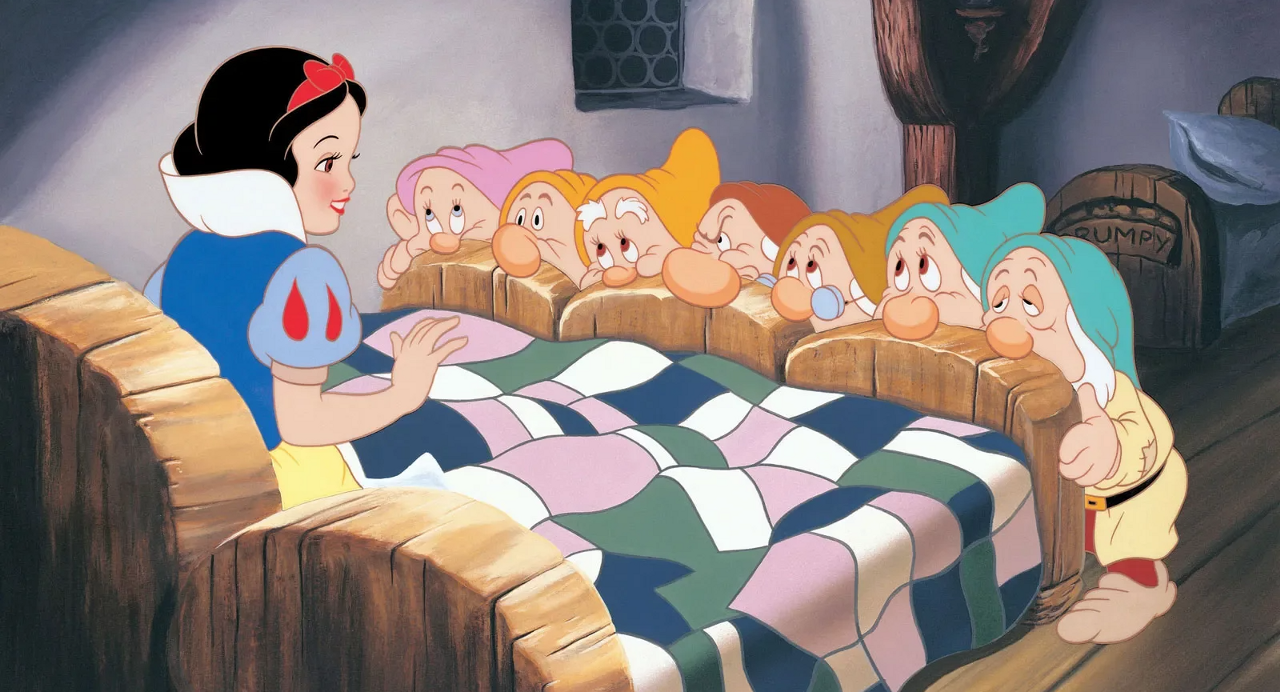 1937’s Snow White and the Seven Dwarfs has been given a 4K UHD upgrade by Disney. As the first full-length cel-animated feature in motion picture history, as well as the most successful, it was expected to be the first Disney film to be released in the higher resolution format, but Disney for whatever reason gave that distinction to 1950’s Cinderella earlier this year.
1937’s Snow White and the Seven Dwarfs has been given a 4K UHD upgrade by Disney. As the first full-length cel-animated feature in motion picture history, as well as the most successful, it was expected to be the first Disney film to be released in the higher resolution format, but Disney for whatever reason gave that distinction to 1950’s Cinderella earlier this year.
Based on the German fairy tale by the Brothers Grimm, Snow White and the Seven Dwarfs was the first animated feature film produced in America, the first produced in full color, and the first to be produced by Walt Disney Productions.
Released in Los Angeles at the end of 1937, the film was nominated for just one Oscar for its score at the 1937 Oscars. After the film’s huge success in 1938, Walt Disney was given an honorary Oscar statuette and seven miniature ones at the 1938 awards to make up for the slight.
The voice cast includes Adriana Caselotti as Snow White, Harry Stockwell (father of Dean and Guy Stockwell) as the Prince, and Lucille LaVerne as the Queen/Witch. Moroni Olson voices the Mirror and Billy Gilbert voices Sneezy.
Looking and sounding better than ever on 4K UHD, extras are included on the accompanying Blu-ray.
Paramount has released 1968’s Rosemary’s Baby on 4K UHD.
The first of the great modern horror films, it preceded The Exorcist by five years. Shockingly nominated for just two Oscars for Roman Polanski’s adapted screenplay and Ruth Gordon’s portrayal of the witch next door, Gordon won for her career high performance.
The film should have been nominated in at least three other categories: Best Picture, Director (Polanski), and Actress (Mia Farrow).
The Best Picture contenders that year included The Lion in Winter, Romeo & Juliet, and Oliver! , which won. Nominated in place of 2001: A Space Odyssey and Rosemary’s Baby were Funny Girl and Rachel, Rachel, neither of which had a contender in the Best Director category. Stanely Kubrick was nominated for 2001: A Space Odyssey but both Polanski and Paul Newman for Rachel, Rachel were outpolled for a Best Director nomination by Gillo Pontecorvo for The Battle of Algiers.
The year’s Best Actress lineup included co-winners Katharine Hepburn for The Lion in Winter and Barbra Streisand for Funny Girl along with Joanne Woodward for Rachel, Rachel, Patricia Neal for The Subject Was Roses, and Vanessa Redgrave for Isadora. Farrow would likely have been nominated over Redgrave if Redgrave’s Isadora had not been given a last-minute Oscar-qualifying run in Los Angeles. It was later trimmed down and released nationally as The Loves of Isadora, the title under which it competed for critics’ awards the following year.
Extras are included on a separate Blu-ray.
Imprint has released Film Focus: Gene Hackman (1970-1977) on Blu-ray featuring four films the actor starred in during the period. They are not The French Connection, The Poseidon Adventure, The Conversation, and Night Moves, but the lesser known I Never Sang for My Father, Bite the Bullet, March of Die, and The Domino Principle.
1970’s I Never Sang for My Father, for which Hackman received the second of his five Oscar nominations, is the best of the lot.
Based on a 1968 Broadway play by Robert Anderson (Tea and Sympathy), starring Alan Webb, Hal Holbrook, Lillian Gish, and Teresa Wright in the roles played on screen by Melvyn Douglas, Hackman, Dorothy Stickney, and Eselle Parsons, the film also earned Oscar nominations for Douglas and Anderson.
Hackman plays the middle-aged son of a cantankerous 80-year-old man (Douglas) torn between his responsibilities as a son and his desire to move to California and re-marry after the death of his wife the previous year. Stickney is Hackman’s mother who dies of a heart attack causing the crisis with his father. Parsons is his sister who lives in Chicago with her family.
The Blu-ray has no extras.
1975’s Bite the Bullet is a classic western co-starring Candice Bergen as both Hackman’s love interest and competition in a 700-mile race across frozen mountain paths and sun parched deserts of the American West at the turn of the 20th Century. The only extra is the film’s trailer.
1977’s March or Die is an exciting adventure film about the French Foreign Legion in the tradition of The Lives of a Bengal Lancer. Hackman leads the cast, which includes Terence Hill, Max von Sydow, and Catherine Deneuve. Extras include audio commentary by film historians Howard S. Berger and Steve Mitchell, and a video essay on director Dick Richards (Farewell, My Lovely) by Berger.
1977’s conspiracy film, The Domino Principle, reuniting Hackman and Bergen, is the least interesting of the group. Despite that, it features the best extras. In addition to audio commentary by Berger and David Nicholas Fojado, it includes a video essay on producer-director Stanley Kramer by Berger and The Devil’s Advocate, a 52-minute presentation by Kramer’s widow, actress Karen Sharpe.
Kramer started out as the producer of such films as Champion, Home of the Brave, The Men, Cyrano de Bergerac, High Noon, and The Caine Mutiny before becoming a director of such classics as The Defiant Ones, On the Beach, Inherit the Wind, Judgment at Nuremberg, Ship of Fools, and Guess Who’s coming to Dinner. 1969’s The Secret of Santa Vittoria was his last successful film. After that, his films descended into absurdity until his last, 1979’s The Runner Stumbles. The Domino Principle was his next to last.
Happy viewing.



















Leave a Reply
You must be logged in to post a comment.